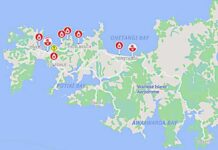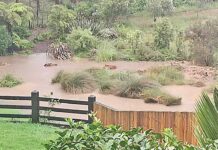For all the difficulties and evidence, we don’t have a housing shortage on Waiheke or even a shortage of land.
It’s a distribution crisis that we as residents and businesses are wrestling with; an entirely predictable imbalance manufactured by Auckland Council’s planning priorities and literally reams of successive planning documents, most of them looking determinedly in the wrong direction.
So the Waiheke Local Board’s re-heated 10-year Housing Strategy, out for public feedback until Wednesday 28 May, should be a pretty big deal for all of us if we are to survive as a community in the changes coming down the line.
Broadly, the draft document has the effect of disempowering the local board, looking past the local government principles of community engagement and deciding that solutions to our housing challenges are beyond the means of local government to address.
The draft strategy – in this version 6 or 7 – has been thrashed out between local board members, council officers and anonymous ‘stakeholders’ behind closed doors with no public process.
Who are the ‘stakeholders’ and where is the input they have provided?
Where is the problem definition? The action plan?
There were 3780 occupied dwellings and 2079 unoccupied houses at the last census, yet the council planning rules for the Gulf Islands alone still favour visitor accommodation over long term dwellings. Average household rates here are significantly higher than almost any other district in the supercity and the average annual household income $20,000 less.
Rents, before the 2018 census, were 32 percent higher than the national median.
The document says the prevalence of short term accommodation “removes housing from available rental supply and applies price pressure in the housing market because potential home owners, including those who may offer the house as a permanent rental, are competing with those for whom the house is a business.”
With Aussie banks on their side.
There are 363 homes self-declared as short term accommodation but more than 1000 active Airbnb and 492 BookABach listings.
“Homeowners are incentivised to rent on a short-term basis because of the higher earnings and flexibility for personal use,” says the plan.
Paul Carew resigned from Waiheke’s Housing Trust a year ago, immensely frustrated at the lack of action – or any opportunities for action over the horizon. A year later the Housing Trust itself is ‘largely supportive’ of the board’s new document, which remains a watered down version of the excellent 2016 action plan.
That three years of independent research by Pam Oliver, Peter Wills and other long term residents seven years earlier gave crystal clear conclusions on the extent and effect of tourism on the island – including housing. The very cogent and urgent action points – which the local board should have strongly lobbied the council to address immediately – are largely ignored or mildly restated in what remains a ‘draft discussion document’,” Paul says.
It’s hard to see a single action that would make housing more affordable as the importance of ‘advocacy’ greases its way through the document.
“Advocate to incentivise a transparent and accountable housing market that prioritises long-term accommodation” is not exactly a call to action.
Vestigial “investigations”, “recommendations”, “future reviews” and, again, “advocacy”, beg the question of why nothing was done years ago.
How about going to talk to a few builders. Local tradespeople. Fossick around the island’s walking wounded who tried and largely failed to build an affordable home on the island this last seven years. Conduct exit interviews with the families emigrating to Sydney leaving huge holes, not least in the classrooms and close-knit communities in the island’s three schools.
How well has the plan to “Encourage responsible growth and development that aligns with the character of Waiheke through advocacy to council and government” gone for us these past seven years?
Last year, Auckland’s mayor said there will be no further capital works for the island in the next decade. Which is handy for the city. If we get no new capital infrastructure, it doesn’t need to stump up for its maintenance down the line.
What’s not to like in a cash-strapped city?
Our $31 million a year in rates over the 12-year life of this supercity would add up to something in the region of $360,000,000 in the supercity’s coffers. The board currently gets seven million dollars to spend, including on staff wages.
How about building some houses on the council land at Ostend, it’s even zoned for it… The board under the chairmanship of Paul Walden worked out a proposal to build houses there, in partnership with Ngāti Pāoa. Council wanted commercial value for the land.
It’s a managerialist tunnel down which the island’s aspirations for a community pool, Mātiatia parking redevelopment, walkway maintenance, the island’s legacy council offices, reserve contributions from developers and what was once a rich pageant of community festivals and community events have withered away.
• Liz Waters
The draft Housing Strategy and information on how to make submissions is available on Auckland Council’s Have Your Say website.
© Waiheke Gulf News Ltd 2025






